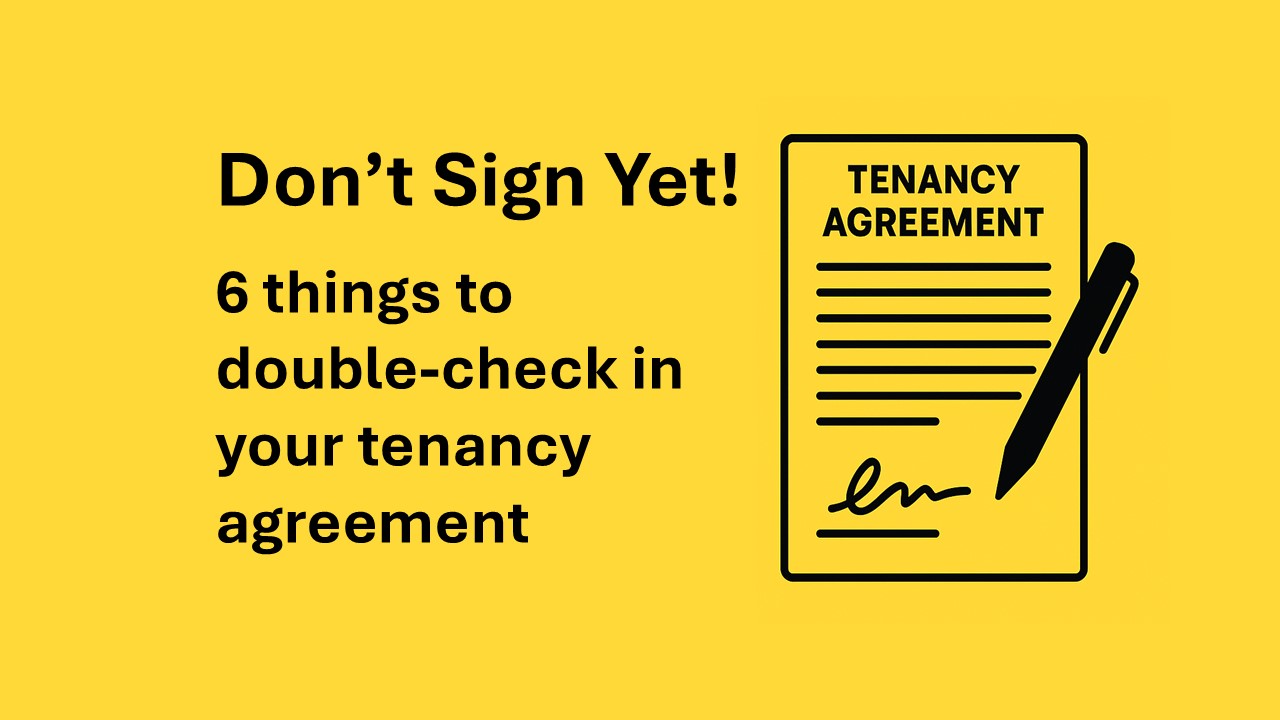Don’t Sign Yet! 6 Things to Double-Check in Your Tenancy Agreement
Economy | 23 Jun 25, 00:00

A tenancy agreement is a legally binding contract that outlines the rights and responsibilities of both tenant and landlord. Failing to read the fine print - or worse, not understanding it - can leave you vulnerable to unexpected costs, unfair terms, or even eviction. To help you avoid future disputes and financial headaches, here are six critical elements to double-check before signing on the dotted line.
1. The Rent Amount and Payment Terms
It may sound obvious, but you'd be surprised how often tenants skip over the basics. Make sure the rent amount listed is exactly what you agreed upon verbally. Clarify:
Due date: When is rent due each month?
Accepted payment methods: Is a bank transfer required, or is cash acceptable?
Late payment penalties: Are there extra charges if you’re a few days late?
Also, watch out for rent review clauses. These outline when and how the landlord can increase your rent during the tenancy. Check if the increase is tied to inflation, market rates, or at the landlord’s discretion. If it feels too open-ended or lacks specifics, ask for it to be clarified or removed.
2. Deposit Amount and Protection
Most tenancy agreements require a security deposit, typically equivalent to four to six weeks’ rent. Confirm the exact amount and make sure the agreement states:
Where your deposit will be held: Unlike the UK, there is no obligation for the landlord to place your deposit in a government-approved protection scheme. So make sure you know whether your deposit is being held by the Letting Agent or the landlord directly.
Circumstances for deductions: Are the conditions for deductions clearly outlined? This could include damage, unpaid rent, or cleaning fees.
Timeline for return: How soon after the tenancy ends will your deposit be returned?
Ask for a written inventory of the property’s condition and contents. This document will serve as proof if any disputes arise later.
3. Duration and Termination Clauses
Double-check the length of the tenancy - whether it's a 6-month, 12-month, or rolling (month-to-month) agreement. Then take a closer look at:
Break clause: This clause allows either party to terminate the contract early. Make sure it specifies how and when notice must be given.
Notice periods: How much notice do you or the landlord need to give to end the agreement? This could vary from 30 days to two months or more.
Renewal process: Is there an automatic renewal, or do you need to give notice if you plan to stay?
Avoid signing any agreement that allows the landlord to evict you with minimal notice or for vague reasons like “at will.”
4. Maintenance Responsibilities
Who handles what? That’s the question this section should answer clearly. Landlords are typically responsible for structural repairs, heating systems, and plumbing. Tenants are usually expected to handle minor maintenance, such as replacing light bulbs or keeping the property clean.
But this line can get blurry. For example:
Is the tenant responsible for garden maintenance?
Who pays for pest control?
What if the boiler breaks?
Make sure the agreement spells out exactly who does what and under what circumstances. Also check for emergency procedures - how and when to report urgent repairs, and what happens if the landlord doesn't respond in time.
5. Restrictions and Special Clauses
Many tenancy agreements include a range of restrictions, and ignoring them can lead to legal trouble or even eviction. Look for and understand clauses related to:
Subletting: Can you rent out a room to someone else? Many landlords prohibit this without written permission.
Pets: Are pets allowed, and if so, are there any additional deposits or cleaning fees?
Smoking: Most landlords ban smoking entirely inside the property.
Alterations: Can you hang pictures, paint walls, or install furniture like bookshelves?
Some contracts may also include oddly specific rules - such as not hanging laundry on balconies or only using certain types of light bulbs. It might seem trivial now, but these clauses can become points of tension later.
6. Utilities and Other Bills
A common source of misunderstanding is who pays for what. While some rentals are “all bills included,” others are not. Your tenancy agreement should clearly state:
Which utilities are included: Electricity, water, gas, internet, TV license?
Rates or service charges: Oridenarily this would be the landlord's responsibility unless stated otherwise.
Metre readings: Is there a record of initial readings? This can help avoid being charged for previous tenants’ usage.
Also ask about shared utility metres in multi-unit buildings. If several tenants share one metre, you’ll want to know how usage is divided fairly - and legally.
Bonus Tip: Ask Questions and Get It in Writing
If anything in the tenancy agreement seems unclear, don’t be afraid to ask questions. Landlords or letting agents are legally obligated to provide clarification. If they agree to make changes, get it in writing - preferably as an updated contract or an official email confirmation.
Verbal assurances mean little in legal disputes. A landlord may say “Don’t worry about that clause, I never enforce it,” but unless it’s removed or amended in writing, it’s still enforceable.
Final Thoughts
Tenancy agreements are designed to protect both the landlord and the tenant - but only if both parties understand and agree to the terms. Never let the excitement of a new home cloud your judgment. Take your time, review each clause, and don’t hesitate to seek legal advice if you’re unsure.
Remember: A rushed signature today can lead to a year of regret tomorrow.
So before you sign, pause—and double-check these six critical areas. Your future self (and your wallet) will thank you.